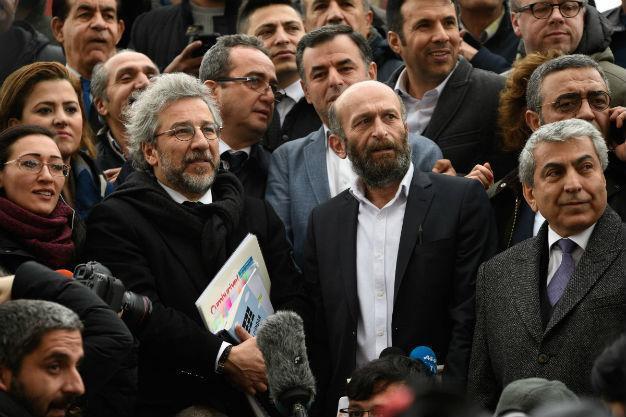Italy says its consul general acted according to Vienna Convention at journalists’ trial
ISTANBUL

DHA photo
The Italian Foreign Ministry said the Italian Consul General in Istanbul acted within the scope of the Vienna Convention on diplomatic and consular relations when attending the first hearing of the trial against two prominent Turkish journalists on March 25.
“[T]he Farnesina informs that the Italian Consul General in Istanbul, Federica Ferrari Bravo, behaved in full compliance with the Vienna Convention on diplomatic and consular relations,” the ministry’s statement said.
This statement, which was in “reference to the Turkish Foreign Ministry’s summons of European diplomats in Ankara to protest against the attendance of some European diplomatic and consular representatives at the first hearing in the trial against two journalists,” came in response to Turkey’s sending of diplomatic notes to the embassies of the eight consuls general who attended the controversial trial in Istanbul on March 25.
Foreign Ministry officials said the sharing on social media of photos at the trial by some diplomatic and consular representatives amounted to an intervention in an ongoing independent judicial process and is incompatible with the principle of impartiality. They said Turkey’s disturbance over the issue had been sent to the related country representatives, Reuters reported.
“Freedom of expression is of fundamental importance for the Country’s political debate, in which the interest of European diplomats is fully justified in the light of Turkey’s position as a European Union accession Country,” read the statement issued by the Italian Foreign Ministry on March 28.
Diplomats from several countries including Germany, the United Kingdom, France, the Netherlands, Switzerland, Canada, Italy and Poland attended the hearing, where U.K. Consul-General in Istanbul Leigh Turner shared images from outside the courtroom and messages of support for the journalists on his official Twitter account.
Dündar and Gül, who were released pending trial on Feb. 26 after a decision by the Constitutional Court, are charged with espionage and threatening state security in stories published in Cumhuriyet about National Intelligence Agency (MİT) trucks allegedly transporting weapons to rebel groups in Syria.
The court said the journalists’ 92-day imprisonment over charges of terrorism was a “violation of rights.”
The court on March 25 accepted the president and Turkey’s intelligence agency as civil plaintiffs in the case.
Within two hours of the start of the proceedings, the judge ordered the trial to be held behind closed doors, granting a request by the prosecution that cited “national security” concerns.
